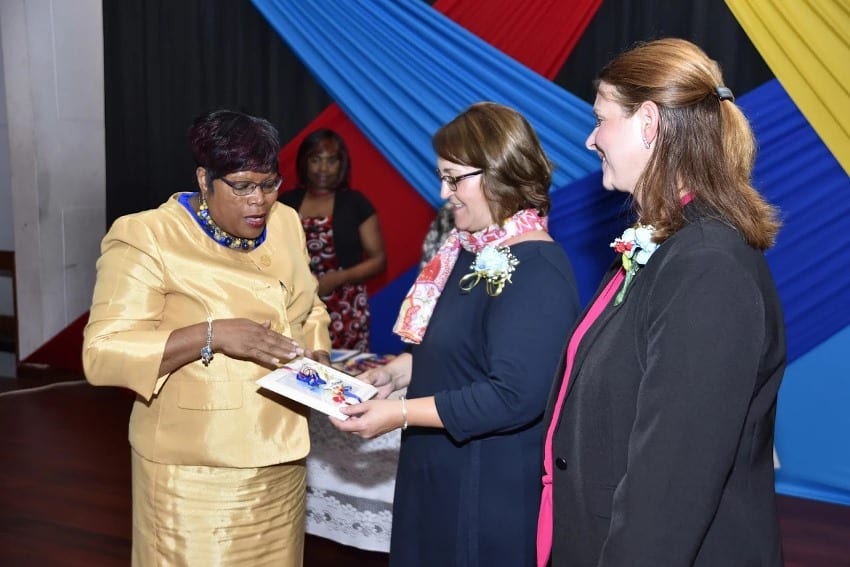
Chief Education Officer, Karen Best chatting with facilitators from New Brunswick Department of Education and Early Childhood Development, Canada – Learning Specialist, Isabelle Cowan (right) and Lead Content Writer of the course, Catherine Breault (centre). (E.Walker/MRD)
Recent training in Autism Spectrum Disorder (ASD) will not be a “one-off” for teachers says this island’s Chief Education Officer, Karen Best.
This assurance came last Friday as she addressed a graduation ceremony at Queen’s College for the first cohort that participated in an online course facilitated by the New Brunswick Department of Education and Early Childhood Development, Canada.
Noting that some of the teachers who topped the course could well find themselves being exposed to another level of training, Mrs. Best stressed: “It is not a one-off because we are building capacity and I expect that at the end of the day you are going to be the ones to push the skills and the knowledge and impart it to other colleagues… not that you are going to get a certificate this evening and you might have that to put on your CV [Curriculum Vitae]; it must be lifted from the CV and operationalised.”
The Chief Education Officer further told the graduates that whenever a child in the education system is deemed to be in need of help, she would be calling on them to assist and impart the skills learnt during the training.
The course, which was done mainly online, saw facilitators from New Brunswick visiting last week to continue face-to-face sessions with teachers and other personnel from the Education Ministry and Erdiston Teachers’ Training College (ETTC).
The two-day group sessions were conducted at the ETTC, Pine Hill, St. Michael and facilitated by Learning Specialist, Isabelle Cowan and Lead Content Writer of the course, Catherine Breault.
Mrs. Cowan, in commending the Ministry of Education, Science, Technology and Innovation, for recognising the need for the training and working with New Brunswick said the course was about “how to support learners with ASD and using evidenced based strategies to support them”.
Noting that their programme was research-based and solid, she said the training framework was first developed in 2014 with the goal of providing high quality evidence-based training that builds capacity.
She added that the training was based on the principles of applied behavioural analysis and there was a wide array of information on the internet.
“Research has helped us feel that Applied Behavioural analysis is the method that can be most useful for individuals with autism. And what is fantastic about that approach is that it counts upon human resources, educators and care givers to set up the environment in a way that students can be successful and to help our students learn play skills, communication skills and vocational and so on,” Ms. Cowan shared.
The co-facilitator, Ms. Breault pointed out that since 2015 and including the group from Barbados, more than 6,000 participants had completed the course. Deeming it an absolute honour and privilege to be part of the project to help build capacity in their own system in New Brunswick and abroad, she told the audience that given the right tools, it was possible to make a difference in the lives of children with autism.
“The feedback from participants was positive…. It makes me very happy to know that so many of you enjoyed the course and that you found it helpful and relevant to your work,” she said, while also expressing the hope that the collaboration would continue.
